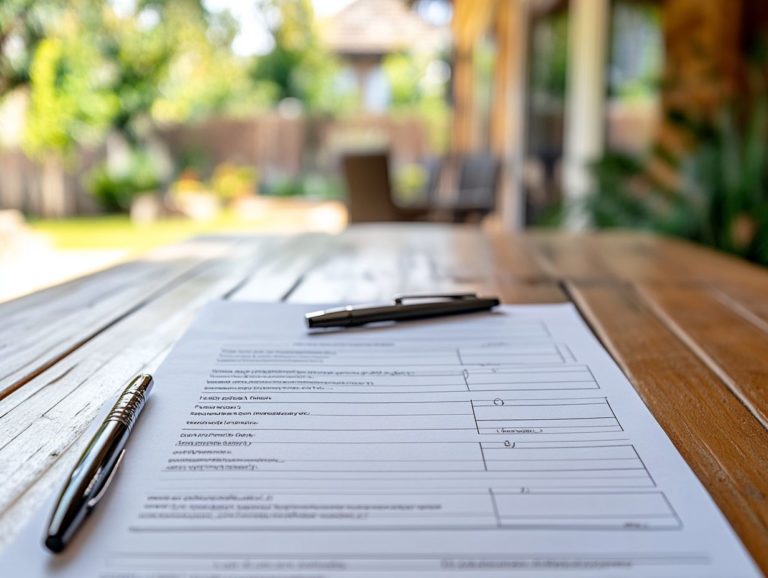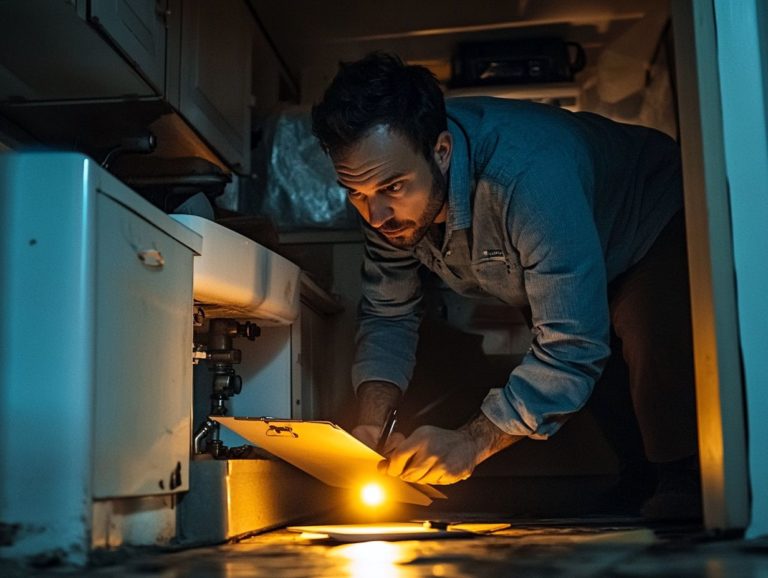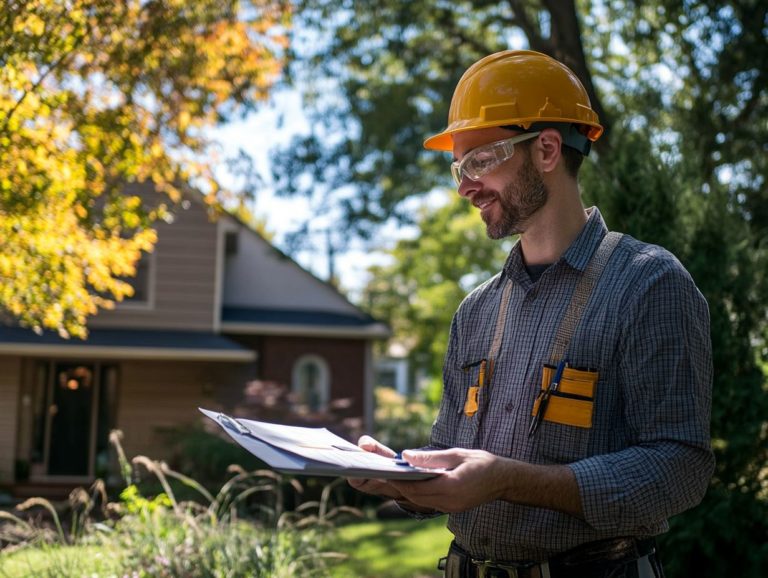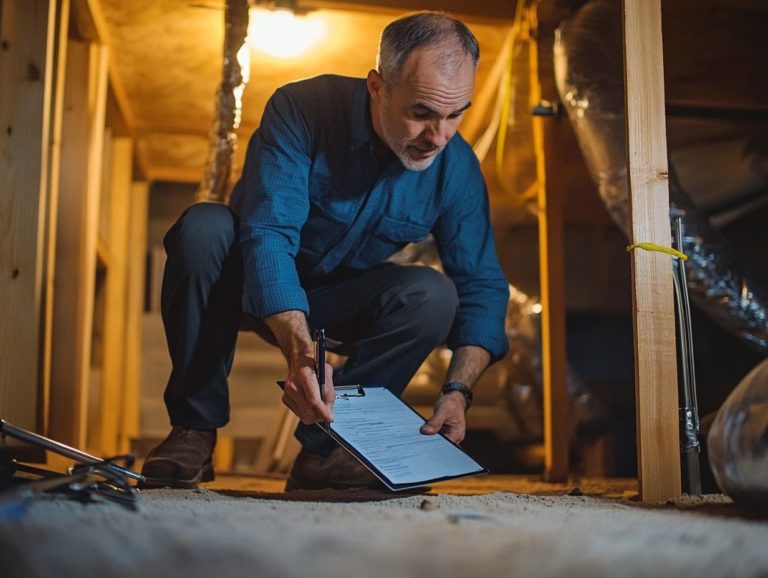How to Avoid Home Inspection Pitfalls
Buying a home ranks among the most significant investments you’ll ever make. A home inspection is an essential step in that journey. It provides a comprehensive examination of the property and uncovers potential issues that could influence your decision.
Don’t miss out on crucial insights! A home inspection can save you from costly mistakes. This guide delves into the essentials of home inspections, emphasizing their importance, common pitfalls to sidestep, and effective preparation strategies. You ll also find valuable tips on interpreting inspection reports and taking appropriate action based on your findings. This ensures you are thoroughly equipped for a successful home-buying experience.
Contents
- Key Takeaways:
- Understanding Home Inspections
- Common Pitfalls to Avoid
- Preparing for a Home Inspection
- Interpreting the Inspection Report
- Taking Action on Inspection Findings
- Frequently Asked Questions
- What are some common home inspection pitfalls to be aware of?
- How can I avoid major structural issues during a home inspection?
- What steps should I take to prevent issues with electrical and plumbing systems during a home inspection?
- What can I do to detect hidden water damage during a home inspection?
- Is it necessary to have a pre-listing home inspection before putting my house on the market?
- Are there any other measures I can take to avoid home inspection pitfalls?
- Ready to make a smart decision?
Key Takeaways:

- Don’t skip the home inspection; it can save you from major headaches and expenses down the road.
- Always hire a qualified home inspector who is knowledgeable and experienced in the type of property you are buying.
- Carefully review and understand the inspection report, as it will inform your decisions on negotiations and repairs.
Understanding Home Inspections
Understanding home inspections is crucial whether you’re buying or selling in the real estate market. To ensure a smooth process, it’s important to know how to prepare your home for a successful inspection. A thorough evaluation can uncover potential issues, including structural concerns.
A qualified home inspector conducts a home inspection and provides you with a detailed report that becomes an invaluable resource. This report educates you about the property’s condition and enables you to make informed decisions regarding necessary repairs before finalizing the sale.
What is a Home Inspection?
A home inspection is an in-depth examination of your property’s condition, performed by a licensed home inspector. They assess critical systems like heating, ventilation, and air conditioning (HVAC), plumbing, and electrical systems, along with the integrity of the foundation to uncover potential issues.
During this meticulous evaluation, the inspector will also scrutinize roofing, insulation, and exterior elements to check safety and working condition. This comprehensive process identifies hidden defects and offers valuable insights into necessary maintenance and future safety hazards.
The resulting inspection report is essential for both buyers and sellers. It summarizes the findings and provides a clear understanding of the property’s condition.
For buyers, this report serves as a powerful negotiating tool. Sellers can leverage it to address any issues, ensuring they present a well-maintained property in the market.
Why are Home Inspections Important?
Home inspections are essential for uncovering hidden safety hazards and significant issues that could impact your investment. They provide a detailed inspection report that identifies necessary repairs and maintenance tasks for your new home.
It highlights immediate concerns and equips you with the knowledge to make informed decisions about your property purchase. By revealing critical information, home inspections alleviate any anxieties you may have and enable you to negotiate repairs or rethink your options.
This proactive approach fosters a sense of responsibility for ongoing home maintenance. Routine inspections help strengthen your home’s condition over time, ultimately preserving or even enhancing its value.
When you understand the importance of regular upkeep, you lay the groundwork for a safe and functional living environment that will benefit you for years to come.
Common Pitfalls to Avoid
Navigating the home inspection process without falling into common pitfalls is essential for both buyers and sellers. To ensure a smooth experience, it’s important to know how to avoid home inspection scams. Overlooking this critical step or neglecting to hire a qualified inspector can result in unexpected expenses and buyer worries later on.
Approach this phase with diligence. By learning how to prepare for a successful home inspection, you can avoid these common mistakes, saving you from financial headaches and keeping your home-buying process smooth.
Skipping the Inspection
One of the biggest mistakes you can make as a buyer is skipping the home inspection. This misstep can lead to costly repairs and lingering concerns about the property’s condition. To avoid this, it’s crucial to learn how to get the most out of your home inspection.
Neglecting this critical step may uncover a host of unforeseen issues that aren’t immediately obvious. Imagine a family purchasing a charming older home in a suburban area, only to discover extensive mold damage lurking behind the walls, costing them tens of thousands in remediation.
Or consider a couple who moved into a new house and were greeted by a leaky roof that resulted in significant water damage issues that were conveniently left unmentioned during the sale.
These scenarios underscore how forgoing a home inspection can create financial burdens, leaving you to navigate expenses you never saw coming. To avoid this, it’s crucial to learn how to ensure a fair home inspection.
Not Hiring a Qualified Inspector

Choosing not to hire a qualified home inspector can lead you to overlook critical issues. To avoid this, it’s important to understand how to prepare for a home inspection. An experienced professional is essential for crafting a comprehensive inspection report that identifies potential problems.
A well-trained home inspector brings a wealth of qualifications and credentials to the table, showcasing their expertise, including certifications from reputable organizations like the American Society of Home Inspectors (ASHI).
These organizations play a pivotal role in maintaining industry standards, ensuring that inspectors adhere to established guidelines and providing you with invaluable peace of mind.
Inspectors bring real-life experience, enabling them to detect not only visible defects but also hidden issues that a novice might easily miss.
Ultimately, when you re seeking someone to assess a property’s condition, opting for a professional with both credentials and experience can significantly diminish the risk of costly mistakes.
Not Reviewing the Inspection Report
Thoroughly reviewing the inspection report is essential to avoid unexpected problems that could lead to costly home repairs down the line. Understanding every aspect of the inspection report is crucial for you as a homebuyer, as it sheds light on the property s current condition and highlights areas that may need attention.
You should carefully examine critical elements such as:
- Structural integrity
- Electrical systems
- Plumbing issues
- Potential safety hazards
Pay close attention to recommended repairs and maintenance schedules noted in the document. If any concerns pop up, discussing them with the inspector can provide clarity on the significance of the findings and help you prioritize which issues to tackle before sealing the deal.
This proactive approach not only protects your investment but also enables you to negotiate repairs or price adjustments with the seller. To ensure you’re fully prepared, check out these tips for a successful home inspection day. Don’t risk it! Get your home inspected today to avoid costly surprises tomorrow.
Preparing for a Home Inspection
Preparing for a home inspection requires both sellers and buyers to grasp the nuances of the process. Knowing what to anticipate while preparing for your home inspection with a comprehensive checklist is essential.
This proactive approach enables you to address any necessary repairs in advance, ultimately enhancing buyer education and instilling confidence in the transaction.
How to Get Your Home Ready
Preparing your home for inspection involves more than just a quick tidy-up; it requires addressing any visible repairs and ensuring that the property is clean and accessible for the inspector. For detailed strategies, check out how to prepare for a home inspection, as this can significantly influence the outcome of the inspection.
Start by diving into a thorough cleaning of the entire property dust surfaces, vacuum carpets, and mop floors until they shine.
Next, tackle necessary repairs: fix those leaky faucets, patch up any holes in the walls, and make sure all windows and doors are in good working order.
Don t forget to ensure that all areas, including attics, basements, and garages, are easily accessible. Inspectors need to evaluate every nook and cranny of your home.
By taking these steps, you not only showcase your property in its best light but also provide potential buyers with a clear understanding of its overall condition, fostering confidence and trust.
What to Expect During the Inspection
During a home inspection, expect a careful check by a certified home inspector. They’ll look for issues and give you a report on any concerns.
This process typically involves assessing major systems like plumbing, electrical, heating, and cooling, as well as structural elements like the roof and foundation.
The inspector will also look for signs of water damage, pest infestations, and the condition of appliances.
With this vital information, you ll be enabled to make informed decisions and feel more confident about the property’s condition. You can address any significant issues before finalizing your purchase.
This inspection acts as a safeguard, easing your concerns and helping ensure a smooth transition into your new home.
Interpreting the Inspection Report
Accurately interpreting the inspection report is crucial for you as a buyer. It helps you distinguish between major and minor issues, guiding your decisions about repairs.
Understanding these differences can significantly impact your investment and prepare you for what lies ahead.
Understanding the Terminology
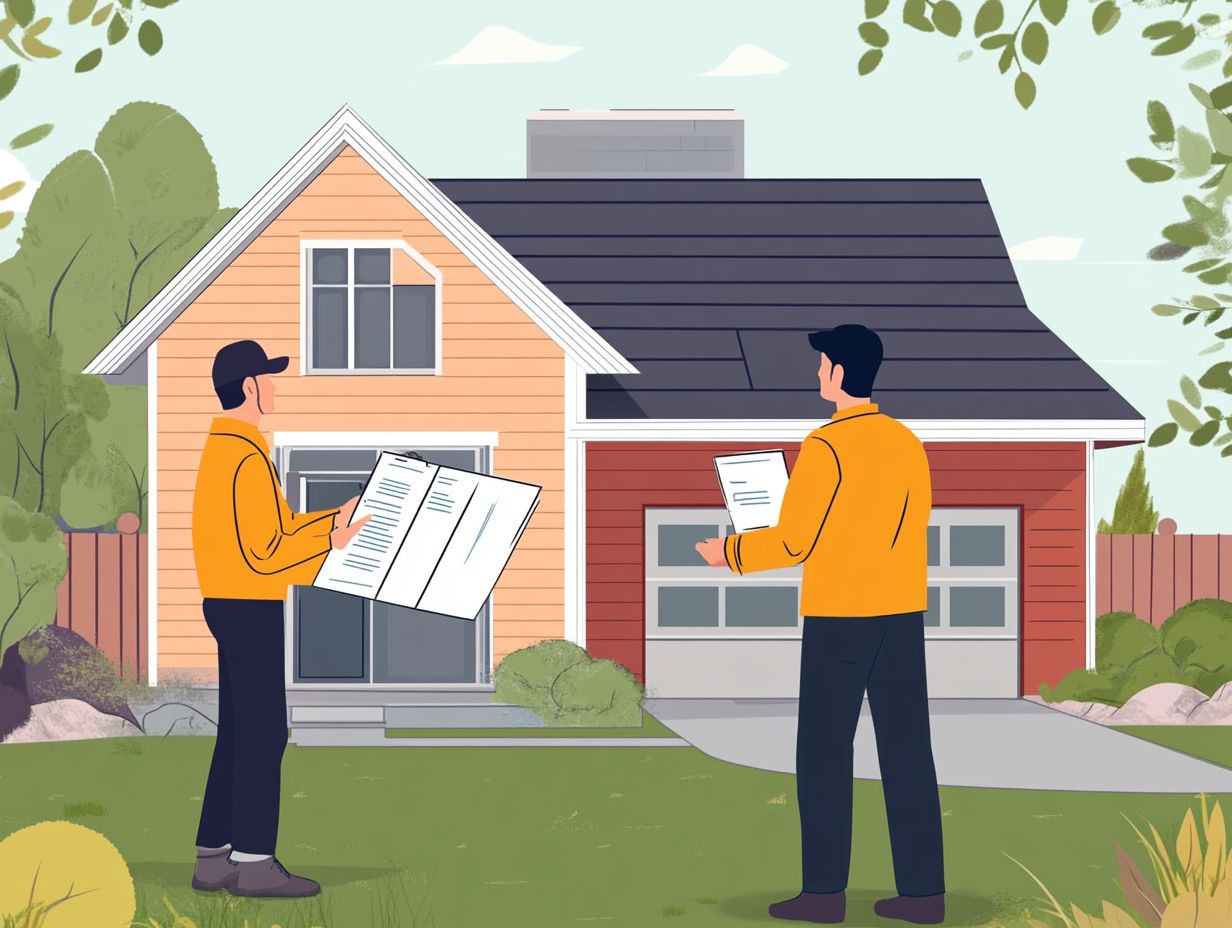
Understanding the terminology in the inspection report is essential for accurately assessing the property’s condition and identifying needed repairs.
Familiarity with common phrases will enhance your ability to interpret the findings. For example, “deferred maintenance” means needed repairs that were not done on time, while “minor cosmetic issues” suggest repairs can wait.
Structural concerns need careful evaluation, as they could influence your negotiations. By mastering this vocabulary, you can confidently discuss matters with realtors and contractors.
This approach ensures you make informed decisions, negotiate effectively, and protect your investment when considering a potential property purchase.
Identifying Major vs. Minor Issues
Identifying major versus minor issues in the inspection report is essential for you, as it influences your negotiating power and repair decisions.
Major issues typically include structural defects, electrical problems, or plumbing leaks, which can significantly impact safety and livability. Minor concerns might involve cosmetic imperfections or routine tasks like paint touch-ups.
Distinguishing between these types of issues is critical. Major problems may prompt you to negotiate assertively for repairs or a price reduction, while minor issues might allow for a more relaxed approach, potentially accepting the property as-is.
Understanding these dynamics helps you craft a strategy that aligns with your specific needs and expectations.
Taking Action on Inspection Findings
Taking action on inspection findings is essential for you as a buyer. It s your chance to negotiate with the seller based on the inspection report.
Addressing identified issues ensures necessary repairs are completed before finalizing the sale, protecting your investment and creating a smooth transition into your new home.
Negotiating with the Seller
When negotiating with the seller, present the inspection findings clearly to ensure any necessary repairs are discussed before finalizing the sale. This structured approach underscores the seriousness of the issues identified and serves as a crucial negotiating tool.
By highlighting specific problems and their implications, you can effectively communicate your concerns and advocate for a fair resolution.
Common outcomes from such negotiations may include:
- Price reductions
- Seller concessions for repair costs
- An agreement to complete repairs before closing
Leveraging the inspection report positions you as an informed stakeholder, making it easier to navigate discussions and reach an understanding that protects your interests.
Deciding on Repairs or Renegotiation
Deciding whether to repair or renegotiate is crucial for buyers. This choice can change the sale terms and ease your concerns.
Consider the urgency of repairs and potential costs involved. Understanding the current market conditions will give you valuable insights, helping you assess your negotiating power.
In a seller’s market, where demand is high, you might consider handling minor repairs yourself to keep your chances of securing the property intact. Conversely, when the market favors buyers, leveraging inspection findings to request repairs or price reductions becomes a viable strategy. This ensures you secure a fair deal that meets your expectations.
Frequently Asked Questions
Got questions about home inspections? Here are some answers!
What are some common home inspection pitfalls to be aware of?

How can I avoid major structural issues during a home inspection?
To avoid major structural issues, thoroughly inspect the foundation, roof, and walls. Look for cracks, unevenness, and signs of water damage.
What steps should I take to prevent issues with electrical and plumbing systems during a home inspection?
Ensure electrical and plumbing systems are professionally inspected and updated if necessary before putting your home on the market.
Check for signs of water damage, such as musty odors, stains on walls or ceilings, and warped flooring. It’s wise to have a professional inspect for potential water damage.
Is it necessary to have a pre-listing home inspection before putting my house on the market?
While a pre-listing home inspection isn’t mandatory, it can help identify potential issues that may arise during the buyer’s inspection. Fixing issues now can streamline your sale!
Are there any other measures I can take to avoid home inspection pitfalls?
Also, keep records of maintenance to show your home s good condition. This helps prevent surprises during the inspection process.
Ready to make a smart decision?
Start your home inspection today!

